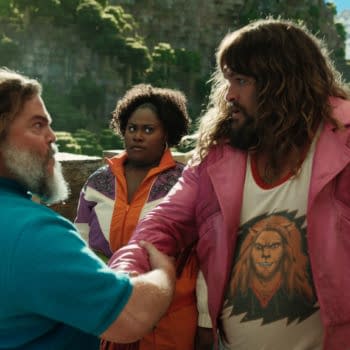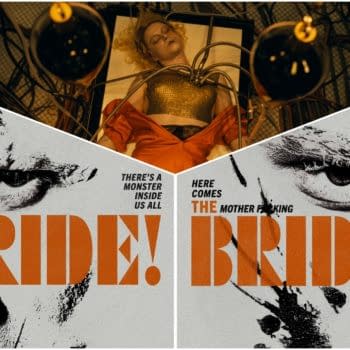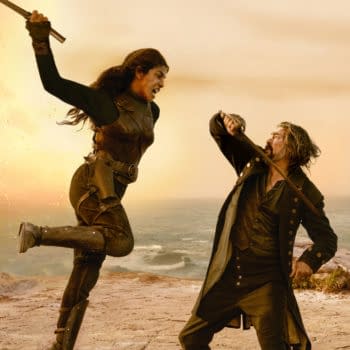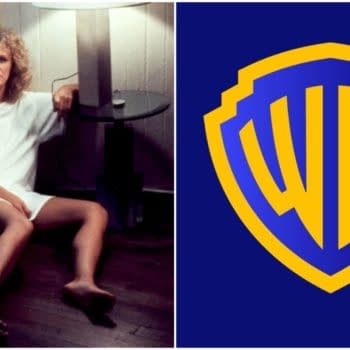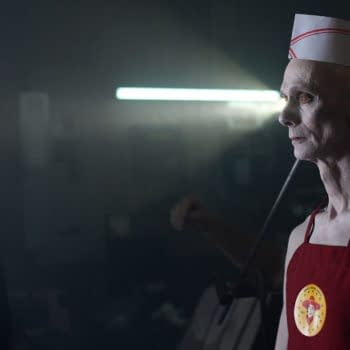Posted in: Movies, Recent Updates | Tagged: entertainment, Francis Urquart, Hosue of Cards, kevin spacey, netflix, robin wright, The West Wing, tv
House of Cards Season 2: Machiavellian Binge-Watching – Look! It Moves! By Adi Tantimedh
Adi Tantimedh writes:
Season 2 of House of Cards was posted on Netflix last weekend, continuing the new model of binge-watching series that are essentially novels for television. It's a particularly interesting piece of zeitgeist pop culture, the type that gets lots of write-ups in the media where pundits and reviewers will spend weeks talking about its quality and merits. It's a show that makes its audience feel clever for watching it.
Here, Frank Underwood, as played by Kevin Spacey, is now Vice President of the United States and in the thick of manipulating a slightly feckless but sincere President and going to war against an industrialist who has the President's ear. And along the way, all the people around them become pawns to be turned, exploited, sacrificed, then discarded.
And it is a quality product, designed to appeal to an upmarket audience, to look like a prestigious show on par with the best HBO show. It features actors like Kevin Spacey and Robin Wright at the top of their game, playing Richard III and Lady Macbeth as a Washington DC power couple. Frank Underwood's ploys and stratagems are straight out of Machiavelli's The Prince and Sun Tzu's The Art of War. The 13-episode season touches on current hot button topics like tensions with China, illegal hacking and surveillance, interparty conflict, sexual assault in the military, backroom business dealings, PR spin and doublespeak, Native American politics, historical commentary and everything you could possibly learn about the processes of the Washington political machine to paint an epic picture of America. Spacey has the supercilious, insincere charm of a viper down to an art as he implicates the viewer in Underwood's long game every time he turns to the camera and delivers a Shakespearean aside. Frank Underwood is more fallible and prone to rage than the UK original's Francis Urquhart and faces more opposition and greater odds, his eyes going from wry amusement to steely murderousness in an instant. You're invited to root for him and his merciless cunning.
The show is a flip-side to the stylized idealism of The West Wing, painting a dark, cynical and depraved world where no friendship or relationship is without a price or an agenda, every gesture has an ulterior motive, and there's always a knife waiting to plunge into someone's back. The earnest and innocent are victims of the powerful, always five steps behind and too naïve to know how to fight back. Even the show's logo features the American flag upside down, which is the symbol for the nation in distress.
What I keep noticing is how the dark hues of the color scheme and cinematography combine with the solemn music are designed to make the show feel as serious and somber as possible, as if everything was of utmost importance. This is a far cry from the lighter, more larky and ironic tone of the original BBC miniseries, though it does loosely follow the plot arc of the second miniseries and novel. This American miniseries' ironies are more bitter, more insidious, more despairing. This is melodrama of the highest order, a fine whisky rather than a cheap beer. Even though you can pretty much predict how each plot twist is telegraphed, their sheer number and density create a large, sprawling, canvas of Washington D.C.
I wonder what the effects of watching this series will have. Does it make viewers want to get more involved with politics? Does it make them even more horrified and disgusted with politicians than ever? Does it simply reinforce the American public's disgust at politics and belief that politicians are two-faced, self-interested, power-hungry sociopaths only concerned with staying in office?
What the show and the likes of The West Wing display is a certainly piousness and reverence for the Oval Office and the political process that the British seldom have in their political dramas or comedies. House of Cards carries a lament and a wish for things to be better and a hope that things might not be that bad, although the news suggest real-life politics might be even worse and more chaotic than the structured, ordered narrative of a scripted drama. It's a far cry from the attitude in the UK and Europe where politics and politicians are seen as an ongoing, permanent mess that's either perfectly normal or a farce to be laughed at. Many reviews talk about how shocking the show is, but I actually think the US House of Cards is still a sly comedy, but you might have to be in a really cynical mood to think so.
Withholding the vote at lookitmoves@gmail.com
Follow the official LOOK! IT MOVES! twitter feed at http://twitter.com/lookitmoves for thoughts and snark on media and pop culture, stuff for future columns and stuff I may never spend a whole column writing about.
Look! It Moves! © Adisakdi Tantimedh














